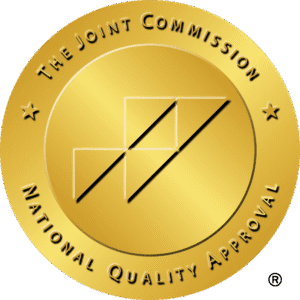Choosing an intensive outpatient program (IOP) is a significant decision that deserves thoughtful consideration.

It’s important to find a program you can trust. After all, you’re investing time, money, and emotional energy in something that’s going to guide and support you through a vulnerable season of your life. Many IOP participants step away from work or other responsibilities for a short time to focus fully on their mental health. Because this sort of dedicated treatment is both rare and valuable, you want to make it count. To assist you in choosing a quality IOP—and one that is a good fit for you—here are four questions to ask when exploring programs.
1) Is the IOP licensed and accredited?
Unfortunately, anyone can open a mental health program and call it an “IOP.” There is no law against using this name. As a result, there is a lack of standardization—and, frankly, a lot of junk—among programs that use this label. Fortunately, there’s one question you can ask to ensure a minimum standard of quality: Is your program licensed and accredited?
Licensure and accreditation are governed by separate regulatory bodies, but both serve the same purpose: to ensure quality and standardization. Typically, licensure is granted by a state department while accreditation is conferred by an independent quality control agency. For mental health IOPs, the accrediting body is Joint Commission.
To obtain state licensure, IOPs must demonstrate that staff members are properly trained and credentialed and that the program operates in safe and sanitary facilities. Compared with state licensing, Joint Commission accreditation goes into much greater depth—reviewing policy manuals, clinical notes, outcome measures, incident reports, and anything else that may impact program quality.
To determine whether an IOP is licensed and accredited, check their website—or, if it’s not easy to find, make it the first question you ask during intake. With so many IOPs available, there’s no reason not to choose one committed to quality control.

2) How big are the groups?
IOPs typically include a mix of individual, family, and group therapy. In practice, most of the time is spent in group sessions. So when choosing an IOP, it’s important to learn as much as you can about the groups you’ll be joining.
Group size varies widely between programs—and this dramatically affects the kind of therapy that’s possible. On one end of the spectrum are programs that favor small groups. For instance, at IOP Services, groups never exceed nine members, and the average group includes five to seven people. By contrast, in other IOPs—particularly many hospital-based programs—groups may exceed 20 members or more.
In large IOPs, group therapy takes on more of a classroom feel: the therapist functions as a teacher presenting psychoeducational material. In smaller IOPs, deeper interaction among group members is possible, and these interactions become the basis for many therapeutic interventions. Based on the work of Irvin Yalom, this kind of IOP group is sometimes referred to as interpersonal group psychotherapy or as a “process group.”
IOP Group Size Comparison
3) What’s the curriculum or group therapy model?
IOPs that provide psychoeducation are typically organized around a counseling model or curriculum. The two most common are Cognitive Behavioral Therapy (CBT) and Dialectical Behavior Therapy (DBT). In broad terms, CBT is the gold standard for treating persons with anxiety and depression, while DBT is more effective for persons with borderline personality disorder. For DBT groups, there is a separate certification that ensures fidelity to the DBT model. (There is no equivalent licensing body for CBT groups.) So, if searching for a DBT group, prioritize programs that are DBT-LBC certified.
While psychoeducational groups are structured by a specific counseling theory and curriculum, interpersonal process groups may appear more unstructured and open-ended. Picture a group of people sitting in a circle (or, for virtual groups, on the same Zoom call) and sharing. What may appear spontaneous, however, should be held together by an evidence-based framework.
For example, IOP Services uses Focused Brief Group Therapy to structure interpersonal process during the first half of each IOP group session, while the second half of group provides psychoeducation in CBT. FBGT, grounded in research on the Circumplex model of personality, helps increase interpersonal flexibility within a supportive group environment. While this is not the only evidence-based approach, a quality program should adhere to some proven model. If a “process group” is really just a group of people sitting in a circle sharing, that’s not therapy—it’s a disaster waiting to happen. So, inquire about the group model.

4) Who is leading the groups?
Because most IOP therapy happens in groups, it’s essential to know who is leading them. Ask about the professional qualifications of your group leader(s)—and make sure the groups are led by fully licensed mental health professionals.
To understand why this matters, it helps to know something about clinical training. To become a therapist, one must first complete a graduate program (in counseling, social work, psychology, or marriage and family therapy), pass a professional exam, and then practice under supervision for two or three years before obtaining full licensure.
Unfortunately, some IOPs hire pre-licensed clinicians—essentially the clinical equivalent of a lawyer who hasn’t yet passed the bar exam—to lead most of their groups. While this saves money, it does so at the cost of experience. Pairing inexperienced therapists with a roomful of clients in acute distress is not a promising combination. When choosing an IOP, confirm that groups are led by fully licensed professionals.
Conclusion
Finding the right IOP takes time and effort, but those investments pay off. When you look back on your experience from the vantage point of your own healing, you may find—as many alumni of IOP Services have shared—that joining an IOP was one of the best decisions you ever made. By asking the right questions up front, you safeguard your time, energy, and hope, and set yourself up for success. Whether you choose IOP Services or another provider, make sure the program you select is licensed and accredited, built on a proven model that fits your needs, led by highly trained clinicians, and committed to measurement-based care.